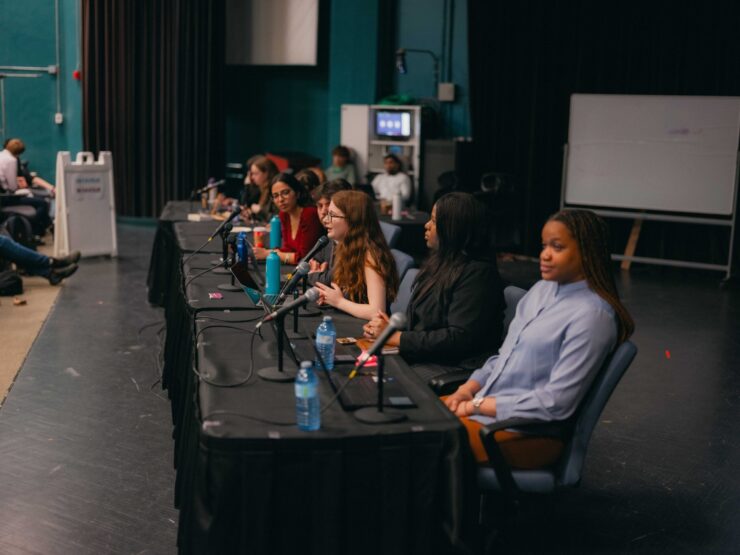WHAT U OF O STUDENTS NEED TO KNOW
On Sunday, March 16, students descended into the Alumni Auditorium for the University of Ottawa Students’ Union’s (UOSU) 2025 edition of the Winter General Assembly (WGA). Students steeled themselves with hot drinks and muffins in-hand to prepare for the indeterminately long day of executive updates, question period, approval of the general election results, constitutional amendments, and three student-submitted motions.
The Fulcrum spent the day providing live coverage that you can read in the X threads below for play-by-play detail.
Although shorter than the 2024 Autumn General Assembly’s almost-eleven hours, this round ran seven-and-a-half hours despite the deceptively short agenda. Governance was a strong theme throughout the day. UOSU executive members shared the last updates before their mandates end on April 30, including a goodbye message from outgoing UOSU President Delphine Robitaille.
Robitaille addressed students saying, “I cannot be more grateful for the trust, kindness and support that I’ve received, both from all of you guys, from the wider [U of O] population. There is so much greatness on this campus, and it has been the honor of my life so far to help support it. I feel fairly confident in saying, and hopefully you do too, that this is the best that UOSU has been, and I can’t wait to see where things continue from here.”
The reflections on the past term continued into question period with questions about culture in the student union, the upcoming club cap, and gaps of representation with representative vacancies. The WGA is also the time to approve General Election results, which follow a contentious candidate race for president this year.
Student election concerns carried over into two of the three student-submitted motions. Motion B proposed repealing Section 6.1.5 of the Elections Code (POL-GEN-04) which prohibits candidates from “campaigning with, for, or on behalf of any other candidate.”
If passed, this motion would have allowed less experienced but qualified candidates to collaborate during elections. Motion C proposed amending Article 4.1.2 of the Constitution to prevent anyone from serving as a Director for more than three terms. These motions led to some serious debate, but reflect the deeper-seated concerns on campus surrounding student governance.
There is a lot to talk about! If you weren’t able to attend or just want a recap in one place, here are the key things we think U of O students should know.
OC TRANSPO WIN
Accessible, reliable, and affordable public transportation has been a hot topic for U of O students — even more so after UOSU’s fall general meeting, which announced OC Tranpo’s plans to increase the U-Pass prices by five per cent in the upcoming year — costing students an estimated $240 dollars per semester.
Included in the Nov. 7 announcement was UOSU’s plan to contest the price change on the ground’s of it breaching their contractual agreement with the company. Since then, UOSU has collaborated with the Carleton Student Association, and municipal representatives against OC Transpo’s planned change, while also bringing awareness to student needs in transportation.
During her winter updates, Robitaille announced that this plan has been “successfully defeated,” and that OC Transpo has recently reached out to UOSU. OC Transpo general manager Renée Amilcar is set to meet with the union shortly.
Regarding the scheduled meeting, Robitaille said that she is “looking forward to see what kind of arguments [OC Transpo brings] in favour of raising costs for no increased service they bring.”
UOSU confirmed that discussions between them, the university administration, and the transport service will remain open.
FLYING SQUAD PREPARES FOR TAKE OFF
The Flying Squad, a motion originally passed in the 2023 UOSU Board of Directors meeting, is emerging as it is announced to be launched in Fall of 2025.
The new service will provide UOSU with a bank of skilled-volunteers for counter-protest deployment covering 14 advocacy issues, including: climate justice, racism, decolonization, LGBTQ+ rights, and workers rights.
Alex Stratas, UOSU advocacy commissioner, explained to the Fulcrum that the concept of having a counter-protest resource was created following a fluctuation in anti-trans movements and a rise in counter-protests. Furthermore, a large number of volunteers will add a “layer of safety,” said Stratas, noting that “attending counter protests is notoriously more dangerous.”
UOSU will fund Flying Squad volunteers with counter-protest training, allowing them to acquire various certifications such as: CPR, Marshall, legal observation, police liaison interactions, and more. Members will also be offered training in skills such as: tabling, flyering, and canvassing.
Flying Squad was not only a topic in UOSU’s semester recap, but was included during question period, as a student asked executives to reflect on “a time they have failed during their mandate.” Stratas replied that Flying Squad was originally supposed to be launched in February of 2025, but due to sick leave it had to be delayed.
“You will have a lot to see for advocacy in September,” she said.
IN THE HOT SEAT
At general assemblies, question period is a key opportunity for students to voice their concerns and curiosities directly to the UOSU executive team. Students came prepared with some difficult, but pressing questions.
Student union culture has been an ongoing concern, from the recent election controversy to executive members resigning during their UOSU mandates. UOSU executives were put in the hot seat and asked to provide examples of where they think they have gone wrong.
Robitaille took time to respond saying that, “some execs, while well-meaning, were not set up for success in their positions, maybe didn’t have all of the knowledge that they ideally would have going in, and didn’t necessarily feel supported enough by our onboarding processes.”
Greg Coleman, the current operations commissioner, also took time to respond to the question. He commented on the union’s stagnated fulfillment of a commitment made at a previous general assembly to divest from Scotiabank.
In club affairs, concerns have emerged over an incoming club cap. Currently with close to 400 clubs, the Univeristy of Ottawa has one of the highest number of recognized student-clubs in the province.
In a Nov. 10 Clubs Committee meeting, a motion was presented to cap the number of clubs recognized by UOSU to 300 clubs. The president of the International Student Association, Adjmal Younoussa, asked if there are criteria on how UOSU will operate to lower the number of clubs.
Club leaders were reassured that if their club is active on campus, they shouldn’t have any worries about being cut. Robitaille explained that club renewal happens annually and only around 80 per cent renew their registration. Current student life commissioner Emilia Bah also expressed plans to include club leaders in the conversation.
UOSU JOINS THE FIGHT FOR BERNADETTE
The precarious status of Garderie Bernadette Child Care Centre (GBCCC) has been the subject of petitions, coalitions, and community involvement since the announcement of it’s planned closure in 2022.
Despite the collaborative efforts of numerous clubs, unions, and organizations on campus including: the uOttawa Childcare Coallition, SCFP 2626 – CUPE 2626, the Association of Professors of the University of Ottawa (APUO), OPIRG, and the Ottawa Socialist Literature Group, prior to the WGA UOSU had yet to demonstrate any plans of committed support.
UOSU’s positioning on the GBCCC was adopted following the presentation of Motion A — Finding Garderie Bernadette Child Care Center a Home — from a member of the Ottawa Socialist Literature Group and UOSU, Noelle Greuel.
The motion was presented for UOSU to “reaffirm the importance of bilingual childcare,” while also including UOSU to join the GBCCC coalition in their fight to provide an alternate location for the child care center and tasking the advocacy commissioner to “develop further resources to support students with children on campus.”
Prior to being unanimously passed, debate on Motion A included comments from UOSU executive Greg Coleman stating that “[the graduate students union] should be working on this, not us … there are other things [our advocacy commissioner] should be putting her energy into.”
Current advocacy commissioner, Alex Stratas replied to Coleman that even if the number of undergraduate students who use the GBCCC is small, she will continue to advise the coalition in terms of how to protest and organize. Stratas will continue to serve as UOSU advocacy commissioner for 2025 – 2026.
The Fulcrum will continue to cover the topic of childcare at the U of O as the story develops.
TO SLATE OR NOT TO SLATE?
Following the motion to support the Bernadette Childcare Center, the general assembly veered unexpectedly into a proposition that would change the way UOSU elections are run. Motion B, proposed by Matthew Edginton, would allow candidates to run as a slate. Slates are groups of students who share similar goals and values and decide to run for executive committee positions under one party.
Slate campaigns have been notably controversial among university student union elections; UOSU currently bans slates under section 6.1.5 of the elections code, stating “No candidate, nor their volunteers unless authorized by the CEO, shall campaign for, with, or on behalf of any other candidate”.
Carleton’s slating system received backlash in 2020, following a major slate, prompting criticism over the nature of slates and its unequal distribution of funding to slates compared to independent candidates. Slates remain a presence on the Carleton campus through its residence association elections.
Since then, slates appear to be prohibited according to section 100 of the Carleton University Students Union (CUSA) elections code. Meanwhile, the University of Toronto’s Students Union (UTSU) has also banned slates, parties and mutual organization.
Edginton argued that candidates who were otherwise qualified to execute their roles, may not “have the skills to run a successful electoral campaign,” thereby pushing newcomers away from UOSU. This motion was introduced against the backdrop of high turnover and allegations of UOSU being a clique.
Another argument in favour of slating was that there is currently no way for the Elections CEO to adjudicate slate complaints, and therefore, the ban should be lifted. Greg Coleman, operations commissioner, and Jérémie Gorman, elected senate representative for social sciences articulated this point.
Similarly, UOSU directors Rayne Daprato and Quanah Traviss argued that UOSU should at least try out the slating system, with Daprato saying “If it doesn’t work, then we can get rid of it,” and Traviss explaining the importance of candidates being able to build off of one another’s ideas.
However, those that opposed the introduction of slating argued that slates would only push more candidates away from running. Sydney Williams, former student life commissioner and current director, explained that established slates would intimidate newer candidates from throwing their hat in the ring, especially women. Addressing the assembly, “Men don’t realize how much intimidation plays a role in whether women run for an election.”
Yusuf Rahman, UOSU web coordinator, argued that “slating isn’t going to solve the biggest problem we have: a lack of candidates. It’ll only make it worse”. He explained that slates would turn the focus away from the qualifications of individual candidates, and be a “step backwards from informed voting.”
I WANNA RUN FOREVER
The last member-submitted motion was also proposed by Edginton. Motion C proposed to amend Article 4.1.2 of the Constitution to read: “No person may serve more than three (3) terms as a Director.” It would also amend Article 4.1.2.1 to define the term of interim Directors.
After a debate addressing concerns that the motion would discourage new candidates from running, and potentially make UOSU unable to change and grow, Daniel Thorp proposed an amendment to add the subclause: “Term limits shall reset upon graduation.” This amendment passed with 82 in favour, 5 against, and 4 abstentions.
After debate resumed on the main motion, Edginton quickly called debate to question. Motion C failed, as it did not achieve the required ¾ majority (40 for, 28 against, 14 abstentions).
WHAT’S NEXT FOR UOSU
Starting May 1, UOSU will operate under the leadership of the newly elected president, Jack Coen, in preparation for the Fall 2025 semester.
Currently, UOSU is hiring a deputy to the president and chief of staff, as well as a clerk of the board of directors, starting in the summer and during the academic year. More information on positions within UOSU, and their progress over the summer can be found on their Instagram @seuo_uosu.
- Editor’s Note: Alex Stratas’s title was mistakenly referred to as equity commissioner rather than advocacy commissioner.






